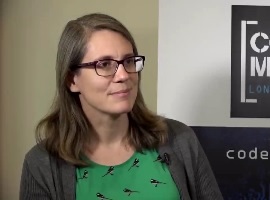InfoQ Homepage Development Content on InfoQ
-
Peter Alvaro on Distributed Programming, CRDTs, LDFI
Peter Alvaro discusses some of the reasons that distributed programming is hard, Lineage-driven Fault Injection, static analysis to check deterministic behaviour, CRDTs, and much more.

-
Interview with Charles Humble on InfoQ and QCon
Alex Blewitt interviews Charles Humble on the origins of the QCon conferences and how he came to be chief editor at InfoQ. They also take a trip down memory lane about how the conferences and news site have grown into an international phenomenon.

-
David Riddoch on Bypassing the Kernel and Hypervisor for Network I/O, Solarflare, OpenOnload
David Riddoch explains how bypassing the OS kernel's networking stack can improve latency and throughput, networking with Solarflare and OpenOnload, hypervisor bypass, and much more.

-
Interview with Gil Tene on Hardware Transactional Memory
Gil Tene speaks to Alex Blewitt at QCon London 2016 on the upcoming support for hardware transactional memory in server-class Intel chips, and what it will mean for the JVM. Tene discusses what kinds of applications will benefit from speculative lock elision and increasing concurrency in the near future on multi-core server platforms.

-
Adrian Colyer on the Morning Paper and Reading Computer Science Papers
Adrian Colyer explains the motivation behind publishing the "Morning Paper" (a blog discussing Computer Science research papers) and mentions some of his favourite papers of the past year.

-
John Sheehan on Web API Quality
In this interview, John Sheehan expounds on what constitutes a high quality API. The first half focuses on developer experience which will help API consumers distinguish between top tier API providers and the rest. The second half provides pointers for API providers aiming to improve various aspects of API quality, specifically performance across the API lifecycle.

-
Josh Long on Spring Boot, Spring Cloud and Microservices
Josh Long talks about the philosophy behind Spring Boot and Spring Cloud. He also discusses some of the common distributed computing problems Pivotal are trying to solve - externalised configuration, service discovery, client-side load balancing, distributed tracing and so on, and talks about some major clients including Netflix, Baidu and Alibaba.

-
Gil Tene on Understanding Latency
Gil Tene explains latency and how it relates to service and response times, measuring latency, common misconceptions about latency, what to do when a system's latency can't meet SLAs, and much more.

-
Stephanie Weirich on Dependent Typing, Extending Haskell, Type System Research
Stephanie Weirich gives an introduction to the ideas behind dependent typing, dependent typing in Haskell, extending Haskell, and the status and future of type theory.

-
Leah Hanson on the Julia Language, Static Analysis
Leah Hanson explains the characteristics of the Julia language, its type system, how to use and implement static analysis for the Julia language in the Julia language, and much more.

-
Monica Beckwith on Tuning and Optimizing Java Garbage Collection
Performance engineer Monica Beckwith covers tuning java garbage collection, including: defining customer requirements; methodology; baselining and measurement; strengths and weaknesses of the different collectors; heap usage; causes of GC pauses; the distribution of pauses; tuning pause characteristics; going off-heap to avoid collection; scaling GC on multi-core and high memory machines.

-
Amir Chaudhry on Unikernels, MirageOS, HalVM, Rump Kernels
Amir Chaudhry explains the ideas behind Unikernels, implementations like the OCaml-based MirageOS and Haskell-based HalVM, Rump Kernels for integrating with legacy code and much more.
